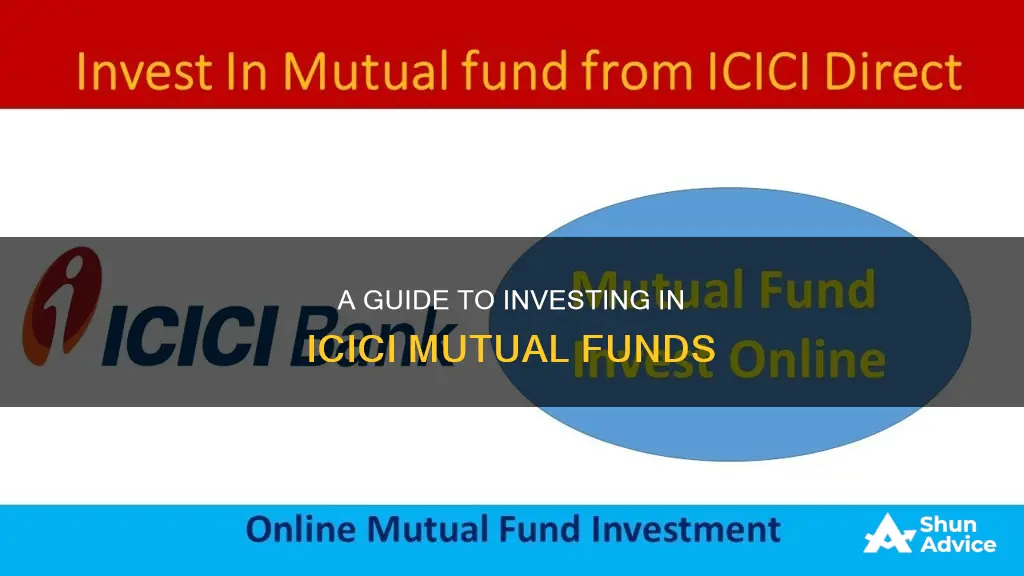
Investing in mutual funds is a popular way to grow your money, and ICICI Bank offers a range of options for those looking to do so. Mutual funds are a type of investment vehicle that pools money from many investors and puts it into various financial asset classes such as equity, debt, and commodities. When you buy a 'unit' of a mutual fund, you're investing in a section of the fund's portfolio, with the price being the Net Asset Value (NAV). ICICI Bank customers can invest in mutual funds by logging into their ICICI Bank Internet Banking and navigating to the 'Investments and Insurance' section, or through the iMobile Pay app. This article will explore the steps to invest in ICICI mutual funds, the benefits, and the different types of funds available.
| Characteristics | Values |
|---|---|
| Process to invest in a Mutual Fund through ICICI Bank | Log in to ICICI Bank Internet Banking and click on the ‘Investments and Insurance’ section > Invest online > Invest in Mutual Funds. Alternatively, use the ICICI Bank’s iMobile Pay app and click on the ‘Invest & Insure’ section > Invest > Mutual Funds. |
| Benefits of Mutual Funds | Diversified portfolio to minimize risk, benefit from power of compounding, instills a sense of financial discipline |
| How are returns earned? | By computing appreciation in the value of your investments over a period compared to the initial investment |
| Are Mutual Funds taxable? | Yes, short-term and long-term capital gains are taxed differently, up to certain thresholds. Refer to the ICICI website for details. |
What You'll Learn

Benefits of investing in ICICI Mutual Fund
Investing in ICICI Mutual Funds offers a range of benefits for investors. Here are some of the advantages:
Diversification of Investments
Mutual funds allow investors to diversify their portfolios by investing in a variety of different financial instruments, including stocks, bonds, debentures, commercial paper, and government securities. This diversification reduces risk and provides small investors with access to a larger basket of securities.
Professional Management
ICICI Mutual Funds are managed by qualified and experienced professionals who have the necessary analytical skills, access to research and information, and time to make sound investment decisions. They carefully monitor investments and track their performance, saving investors time and effort.
Flexibility in Investment Amounts
ICICI Mutual Funds offer the flexibility to invest small amounts of money as and when the investor has surplus funds available. This makes it accessible to a wide range of investors, even those who may only be able to invest smaller sums.
Liquidity
Open-ended funds, a type of mutual fund offered by ICICI, provide high liquidity as they can be redeemed at any time. This gives investors easy access to their funds if needed.
Regulatory Oversight
Mutual funds in India are registered with the Securities and Exchange Board of India (SEBI), which monitors their activities. This provides investors with an added layer of oversight and protection, ensuring that the funds are operating within regulatory guidelines.
Long-Term Wealth Creation
ICICI Mutual Funds offer the potential for long-term wealth creation by investing in a diverse range of asset classes. The power of compounding further enhances the growth potential of these investments over time.
ICICI Mutual Funds, therefore, provide a well-regulated, professionally managed, and flexible investment option for individuals looking to grow their wealth over the long term while minimising risk through diversification.
Unlocking Down Payment Strategies for Your Next Investment Property
You may want to see also

How to invest in ICICI Mutual Fund online
Investing in ICICI Mutual Funds online is a simple and convenient way to invest and manage your personal finances. Here is a step-by-step guide on how to invest in ICICI Mutual Fund online:
Step 1: Sign Up for an Account
If you don't already have an account with a platform that offers ICICI Mutual Funds, you will need to sign up for one. You can use platforms such as Groww, ICICI Direct, or ICICI Bank. Registering for a new account is usually free and can be done online.
Step 2: Provide Documentation
Once you have an account, you will need to provide documentation for identification and address verification. Commonly accepted documents include Aadhaar, PAN, Driver's License, Voter ID Card, government-issued identification, or your Passport. Any document that mentions your permanent address can be used for address verification.
Step 3: Determine Investment Length and Risk Level
Before selecting a specific ICICI Mutual Fund, you should consider the length of your investment and your risk tolerance. Different funds have different investment horizons, and higher potential returns typically come with higher risks.
Step 4: Select an ICICI Mutual Fund
Based on your criteria and financial goals, choose the most suitable ICICI Mutual Fund. You can consider factors such as the fund's performance, asset allocation, risk level, and fees. ICICI offers a wide range of funds across different asset classes, including equity, debt, and hybrid funds.
Step 5: Choose Investment Type
ICICI Mutual Funds typically offer two types of investments: lump-sum investment and Systematic Investment Plans (SIPs). With a lump-sum investment, you invest a one-time amount. On the other hand, SIPs allow you to invest smaller amounts regularly over a period of time.
Step 6: Start Investing
After you have selected the fund and investment type, you can initiate your investment by following the platform's instructions. You will likely need to provide payment details and specify the amount you wish to invest.
It is important to remember that mutual fund investments are subject to market risks, and it is essential to read all scheme-related documents carefully before investing. Additionally, consider seeking independent financial advice to ensure that the investment aligns with your financial goals and risk tolerance.
Best Mutual Funds to Invest in India: Top Picks
You may want to see also

Understanding Net Asset Value (NAV)
Net Asset Value, or NAV, is the price of a Mutual Fund. When you buy a 'Unit' of a Mutual Fund, you are investing in a section of the fund's portfolio, and the price of this is the NAV. It is calculated by dividing the current value of the assets in the fund's portfolio by the total number of units owned by all investors. So, if you want to purchase or redeem Mutual Fund units, you can do so at the fund's current NAV. This is declared at the end of each trading day.
NAV is an important factor when it comes to investing in Mutual Funds. It indicates the price and is used to calculate returns on your Mutual Fund investments. So, if you want to benefit from the power of compounding, investing regularly via a Systematic Investment Plan (SIP) with a small amount is a good strategy. Over time, the benefits of compounding will increase.
When investing in Mutual Funds, you can also take advantage of a diversified portfolio to minimise risk. This is another benefit of this type of investment vehicle. Your money is not tied to just one company or industry, but rather a variety of securities, which minimises the risk to your portfolio.
When it comes to choosing a Mutual Fund, it is a two-step process. First, select the Mutual Fund category based on your investment objective, time horizon, and risk tolerance. Then, choose a Mutual Fund scheme within that category based on its relative performance against benchmarks and its category, as well as the consistency of its performance. Other important aspects to consider are the Asset Management Company (AMC) track record, the fund manager's experience, the scheme's Asset Under Management (AUM), and the expense ratio.
Debt Funds: Where Does Your Money Go?
You may want to see also

Are ICICI Mutual Funds a good investment option?
Mutual funds are a popular investment vehicle for financial planning. They are a professionally-managed trust that pools money from a group of investors and invests in a wide variety of financial asset classes such as equity, debt, and commodities. Mutual funds are a good investment option for investors looking to diversify their portfolios. Instead of investing in just one company or industry, a mutual fund investor gains exposure to different securities, thereby minimising the risk to their portfolio.
ICICI Bank offers its customers the option to invest in mutual funds online. You can invest in mutual funds by logging in to ICICI Bank Internet Banking and following the steps: click on the ‘Investments and Insurance’ section > Invest online > Invest in Mutual Funds. Alternatively, you can use the ICICI Bank iMobile Pay app and follow these steps: click on the ‘Invest & Insure’ section > Invest > Mutual Funds.
There are several benefits to investing in mutual funds. Firstly, they offer the benefit of compounding. The longer the time horizon, the higher the benefit of compounding. Secondly, mutual funds allow you to start investing regularly with a small amount through a Systematic Investment Plan (SIP). Mutual funds also offer a diversified portfolio to minimise risk and help instil a sense of financial discipline, enabling you to stick to your investment goals without being impacted by intermittent volatility.
When you buy a 'Unit' of a mutual fund, you invest in a section of the fund's portfolio value. The price of a mutual fund is expressed as the Net Asset Value (NAV), which is calculated by dividing the current value of assets in the fund's portfolio by the total number of units owned by all investors. You can purchase or redeem mutual fund units as per your requirements at the fund's current NAV, which is declared at the end of each trading day.
Short-Term Investment Strategies: Where to Invest Your Money
You may want to see also

How to choose the right ICICI Mutual Fund
Choosing the right ICICI Mutual Fund is a two-step process. Firstly, you need to select the Mutual Fund category based on your investment objectives, time horizon, and risk tolerance. Secondly, after selecting the Mutual Fund category, you need to choose a Mutual Fund scheme within that category. The factors to consider when choosing a scheme include its relative performance versus the benchmark and its category, the consistency of its performance, the AMC track record, the fund manager's experience, the scheme's Asset Under Management (AUM), and the expense ratio.
When selecting a Mutual Fund category, it is important to consider your investment objectives. Different categories of Mutual Funds have different investment objectives, such as growth, income, or a balance of both. You should choose a category that aligns with your financial goals and risk tolerance. The time horizon is also an important factor, as some Mutual Funds may be more suitable for long-term investments, while others may be designed for shorter-term goals.
When evaluating the performance of a Mutual Fund scheme, consider its relative performance against the benchmark and its category. Compare the scheme's returns with those of similar funds in the same category to assess its performance. Consistency of performance is also key; look for schemes that have consistently delivered strong returns over time, rather than those with sporadic high returns.
The Asset Under Management (AUM) and expense ratio are important financial metrics to consider when choosing a Mutual Fund scheme. The AUM refers to the total value of the assets managed by the fund. Larger funds with higher AUMs may have better negotiating power and lower expense ratios, which can impact the overall returns. The expense ratio represents the fund's operating expenses as a percentage of its total assets. A lower expense ratio means that a larger portion of the fund's assets is being invested, potentially resulting in higher returns.
In addition to the quantitative factors mentioned above, it is also important to consider the qualitative aspects, such as the AMC track record and the fund manager's experience. The AMC, or Asset Management Company, is responsible for managing the Mutual Fund. Selecting a fund from an AMC with a strong track record and experienced fund managers can inspire more confidence in the management of your investment.
Mutual Fund SIPs: Where to Invest for Maximum Returns
You may want to see also
Frequently asked questions
A Mutual Fund is an investment vehicle that accumulates money from a group of investors and invests in a variety of financial asset classes. The value of a Mutual Fund is tied to the performance of its composite assets.
You can invest in ICICI Mutual Funds by logging into ICICI Bank Internet Banking and navigating to the 'Investments and Insurance' section, or through the iMobile Pay app by clicking on the 'Invest & Insure' section.
Mutual Funds are a good option for investors looking to diversify their portfolios. Instead of investing in a single company or industry, Mutual Funds allow investors to invest in different securities, minimising risk.
Mutual Fund returns are calculated by comparing the appreciation in the value of your investments over time to the initial investment. The Net Asset Value (NAV) of a Mutual Fund indicates its price and is used to calculate returns.







